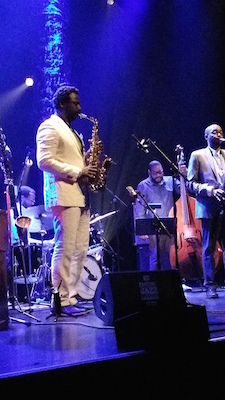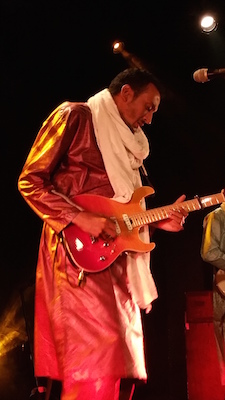Jazz Review: Montreal Jazz Festival — An Ecosystem That Celebrates Sound
Berber guitarist Omara “Bombino” Moctar proved that the gifts behind the fingers are still all that matters.
By Milo Miles
Extended music presentations like the 2018 Montreal Jazz Festival are ecosystems, though that’s not obvious at first. A big string of parties or maybe an extended circus are comparisons that come to mind more readily. But ecosystem gives you better understanding in the long run. Certainly on how to report on music fests. You can strive to describe as many acts as possible, which is like going over every square foot of a landscape, and just as boring. Or you can do All Big Names that your editor thinks will attract maximum eyeballs, which reduces a panorama to mountain tops. This scruffy old vet thinks the most satisfying method is to emphasize the events where you felt most at home in the ecosystem of acts, and, above all, present the happy surprises.
Must get the unhappy ones out of the way, though. Music festivals have changed from operations with a head honcho like George Wein and a stable team year after year into (nonprofit) corporate-controlled megaoperations with, like everyone else, a changed relationship to the media. As never before in my 40 years of scoring credentials, press tickets are in short supply.
Montreal Jazz 2018 got off to an even more (Canadian) rocky start on July 2nd when we found out that due to ill health, post-bop band master Carla Bley would not be directing L’Orchestre national de jazz de Montreal in a performance of her own orchestral works. For me, this would be like covering the Jimi Hendrix Experience with a substitute lead guitar. Worse, my photographer (we happen to be married) would not be able to have a seat with me. I knew that Michael Ullman also intended to review the show, and Bley was too much the central draw.
Instead, we scored special seats for an open-air performance by veteran local favorites Nomadic Massive. The diverse, adoring audience was a delight and it was impossible to dislike the ambition of the group’s rock/rap/funk/jazz fusions. It was also impossible, in the seething record-breaking humidity and heat, to feel they were tearing the roof off the sucker.

Brian Blade and his long-term group the Fellowship Band at the Montreal Jazz Festival. Photo: Donna Wong.
The next day, pleasant discoveries began to happen in the air-conditioned Monument-National hall with drummer Brian Blade and his long-term group the Fellowship Band. The first jolt was that I had missed the group’s most recent couple of albums. Blade, along with bassist Christ Thomas, pianist Jon Cowherd, tenor saxophonist Melvin Butler, and alto sax and bass clarinetist Myron Walden began with material from their latest release Body and Shadow (Blue Note). This was more meditative (and sometimes elliptical) than early work I knew, but in no way geriatric or pandering. Butler and Walden turned out to be canny, dramatic conversationalists with each other, exchanging growls and sighs with increasing power through the show. The finale of the regular set was Cowherd’s “The Odyssey,” which rose from nearly pastoral beginning to no-limits rave. (Despite much looking, I cannot locate a recorded version of this number. If anybody knows of one, clue me in with a comment.)
The next night, a 4th of July I’ve never been happier to be out of the US, presented the irresistible challenge of brilliant players in an unconventional format with perhaps contrasting styles. Bassist Dave Holland has such quicksilver intelligence and authoritative sound there was no question he could find a way to mingle with the tabla percussion of veteran Zakir Hussain, who has been stretching and restructuring since his days with guitarist John McLaughlin (Hussain’s first original was dedicated to his old bandleader). The final member of the trio, saxophonist Chris Potter, stood tall as his companions with an original, “Island Feeling,” that hit me with a splash of realization: this is what all that vintage “exotica” fusion wanted to be in its wildest fantasies, but never got close. The flawless acoustics of Maison symphonique de Montreal offered a final revelation – I had never heard the full details of Hussain’s percussion explorations – the taps and rumbles, the pings and undulating tones he assembled, again and again.

Berber guitarist Omara “Bombino” Moctar in action at L’Astral, Maison de Festival. Photo: Donna Wong.
We had to leave the trio’s set a bit early to catch our final choice, the rocking Berber guitarist Omara “Bombino” Moctar at L’Astral, Maison de Festival, a dark, sweaty club suited for all out jams. And did Bombino’s quartet deliver. Photographers could get right up to the edge of the stage and you only have to put away the camera after three numbers, you don’t have to move. Bombino’s latest recording puts a shade too much emphasis on his weakest tool (his vocals), but on stage the vigor of everything was tripled. Again, with remarkably clear and precise sound – we were 10 feet away from the amp the whole show and did not have buzzing ears the next day. Bassist Youba Dia, with his glow-in-the-dark green strings, is a bit of a cut-up who was able to deliver witty remarks in French and expressive asides when the players needed a breather. It was a treat to watch all of the guitarist’s nifty dance kicks on the fast numbers as his instrument slashed open the air and pulled the whole crowd into collective flight. The notion nowadays is that electric guitar bands are passé, even played out. Bombino proved that the gifts behind the fingers are still all that matters. And that, yes, part of a full Festival ecosystem is an old-fashioned delirious celebration of sound.
Milo Miles has reviewed world-music and American-roots music for “Fresh Air with Terry Gross” since 1989. He is a former music editor of The Boston Phoenix. Milo is a contributing writer for Rolling Stone magazine, and he also written about music for The Village Voice and The New York Times. His blog about pop culture and more is Miles To Go.
Tagged: Brian Blade and the Fellowship, Chris Potter, Dave Holland, Fellowship Band, Milo Miles, Montreal Jazz Festival, Nomadic Massive
